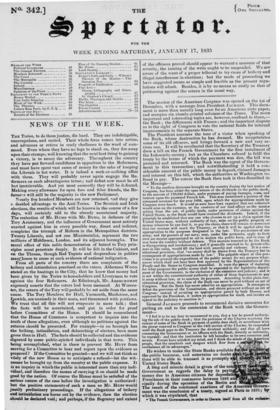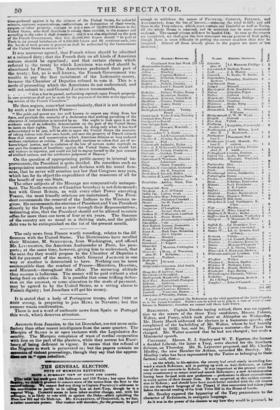The session of the American Congress was opened on the
1st of December, with a message from President JACKSON. This docu- ment is more the.n usually long even for an American state paper, and occupies six closely-printed columns of the Times. The more important and interesting topics are, however, confined to three,— the Bank ; the differences with France; and the important dispute as to the right of Congress to vote the national funds for internal improvements in the separate States.
The President assumes the tone of a victor when speaking of the Bank, whose destruction he has doomed. He recapitulates some of its old offences, and brings forward a new and very se- rious one. It will be recollected that the Secretary of the Treasury drew a bill on the French Government for the first instalment of the Indemnity-money; but as the Chambers refused to fulfil the treaty by the terms of which the payment was due, the bill was protested and returned. The Bank was the agent of the Govern- ment in this transaction; and notwithstanding it held a con- siderable amount of the publie money in deposit, claimed damages and interest on this bill, which the authorities at Washington re- fused to pay. The course the Bank then took is thus described in the Message-
" To the needless distresses brought on the country during the last session of Congress, has been added the open seizure of the dividends on the public stock, to the amount of 170,041 dollars, under pretence of paying damages, costs, and interest upon the protested French bill. This sum constituted a portion of the estimated revenues for the year 1834, upon which the appropriations made by Congress were based. It would as soon have been expected that our collectors would seize on the customs, or the receivers of our land offices on the monies arising from the sale of public lands, under pretences of claims against the United States, as the Bank would have retained the dividends. Indeed, if the principle be established that any one who chooses to set up a claim against the United States may, without authority of law, seize on the public property or money wherever he can find it, to pay the claim, there will remain no assurance that our revenue will reach the Treasury, or that it will be applied after the appropriation to the purposes designated in the law. The pa) masters of our army, and the pursers of our navy, may, under like pretences, apply to their own use monies appropriated to set in motion the public force, and in time of war leave the country without defence. This measure resorted to by the Bank is disorganizing and revolutionary ; and if generally resorted to by pi ivate citi- zens in like cases, would fill the land with anarchy and violence. It is a con- stitutional provision, that no money shall be drawn from the Treasury but in consequence of appropriations made by law.' The palpable object of this pro- vision is to prevent the expenditure of the public money for any purpose what- soever which shall not have been first approved by the Representatives of the
People and the States in Congress assembled. It vests the power of declaring for what purposes the public money shall be expended in the legislative depart- ment of the Government, to the exclusion of the executive and judicial ; and it
is not within the constitutional authority of either of those departments to pay it away without law, or to sanction its payment. According to this plain con- stitutional provision, the claim of the Bank can never be paid without an act of Congress. But the Bank has never asked for an appropriation. It attempts to defeat the provision of the Constitution, and obtain payment without an act of Congress: instead of awaiting an appropriation passed by both Houses, and approved by the President, it makes an appropriation for itself, and invites an appeal to the judiciary to sanction it."
General JACKSON proceeds to recommend decisive measures for putting an end to the connexion of the Bank with the Govern- ment— " I feel it to be my duty to recommend to you, that a law be passed authoriz- ing the sale of the public stock ;' that the provision of the Charter requiring the
receipt of notes of the Bank in payment of public dues shall, in accordance with
the power reserved to Congress in the 14th section of the Charter, be suspended until the Bank pays to the Treasury the dividend withheld ; and that all laws connecting the Government or its officers with the Bank, directly or indirectly, be repealed : and that the institution be left hereafter to its own resources and means. Events have satisfied my mind, and I think the minds of the American people, that the mischiefs and dangers which flow from a„pokarcgartyr, far overbalance all its advantages."
He wishes to make the State Banks available the public business, and entertains no doubt tions will be able to transact it as promptly United States Bank.
A long and minute detail is given of the con Government as regards the delay in payin ifif;:w.;• money due to American citizens for depredati ' • Frenchmen in their commerce between 1803 an ••
cipally during the operation of the Berlin and • The result of the continued exertions of the American r .vern- ment was the conclusion of a treaty, signed at Paris in 1831; by which it was stipulated, that "The French Government, in order to liberate itself from all the redness tines preferred against it by the citizens of the United States, for unlawful seizures, captures, sequeatratioaa, confiscatiess, or destvuction of their vessels, cargoes, or other property, engages to pay a sum of :25,000,000 francs to the Vatted States, who shall distribute it among those entitled, in the manner and according to the rules it shall determine ; and is was also stipulated on the part a the French Government, that this 25,000,000 franc. should " be paid at Paris in six annual instalments of 4,166,666 francs and 66 centimes each, into the hands of such person or persons as shall be authorized by the Government d the United States to receive it."
It was moreover agreed, that French wines should be admitted at a reduced duty ; that the French duty on all kinds of American cottons should be equalized ; and that certain claims which referred to the treaty by which Louisiana was ceded should be abandoned by France. The Americans performed their part of the treaty ; but, as is well known, the French Government was unable to pay the first instalment of the Indemnity-money, because the Chamber of Deputies refused to vote it. This is a mode of proceeding which the Americans do not understand, and will not submit to ; and General JACKSON recommends, . . . . "that a law be passed, authorizing reprisals upon French propertr in case provisions shall not be made for the payment of the debt at the approach- ing session of the French Chambers."
He then argues, somewhat inconclusively, that it is not intended by such a law to threaten France-
" Her pride and power are too well known to expect any thing from her fears, and preclude the necessity of a declaration that nothing partaking of the character of intimidation is intended by us. She ought to look upon it as the avidence only of an inflexible determination on the part of the United States to insist on their rights. That Government, by doing only what it bag itself Acknowledged to he just, will be able to spare the United States the necessity of taking redress into their own hands, and save the property of French citizens from that seizure and sequestration which American ditizens so long endured without retaliation or redress. If she should continue to refuse that act of ac- knowledged justice, and in violation of the law of nations make reprisals on our part the occasion of hostilities against the United States, she would but add violence to injustice, and could not fail to expose herself to the just censure of civilized nations, and the retributive judgment of Heaven."
On the question of appropriating public money to internal im- provements, the President is quite decided. He considers such an appropriation unconstitutional; and declares with his usual firm. Bess, that he never will sanction any law that Congress may pass, which has for its object the expenditure of the resources of all for the benefit of any one State. The other subjects of the Message are comparatively unimpor- tant. The North-western or Canadian boundary is not determined; but with Great Britain, as with every other Power excepting France, the most friendly relations are maintained. The Presi- dent recommends the removal of the Indians to the Western re- gions. He recommends the election of President and Vice-President directly by the People, not as now through their Representatives; iatimatiag also, that the President should not be allowed to retain office for more than one term of four or six years. The finances of the country are as usual in a thriving state, and the public debt was to be extinguished on the 1st of the present month,



























 Previous page
Previous page